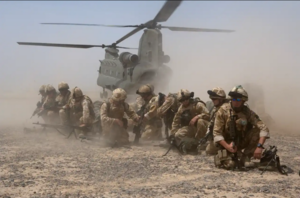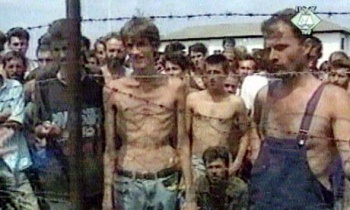Bosnian War
 | |
| Date | 6 April 1992 - 4 December 1995 |
|---|---|
| Location | Yugoslavia |
| Interest of | Robert Badinter, Stefan Karganovic, Noel Malcolm, Ruder Finn |
| Description | Part of the Yugoslavian Wars, this one had it all as well, rape, NATO war crimes and hidden interests |
The Bosnian War was an international armed conflict that took place in Bosnia and Herzegovina between 1992 and 1995, after it declared independence. The war is commonly seen as having started on 6 April 1992, following a number of earlier violent incidents. The war ended on 14 December 1995. The main belligerents were the forces of the Republic of Bosnia and Herzegovina and those of Herzeg-Bosnia and Republika Srpska, proto-states led and supplied by Croatia and Serbia, respectively.[1]
NATO countries played a large part, both in the war itself and behind the scenes. Eventually they inverted with a bombing campaign, presented as a humanitarian intervention.
Contents
DynCorp
| CIA documents about US role in Bosnia released - See: https://www.cia.gov/readingroom/collection/bosnia-intelligence-and-clinton-presidency |
- Full article: DynCorp
- Full article: DynCorp
The CIA front company DynCorp engaged in sex with minors and sold them to one other as slaves. One of Jeffrey Epstein’s suspected trafficking aircraft shared the same tail number as a State department Bronco used under contract by DynCorp.
Markala false flag
- Full article: Markale
- Full article: Markale
The 1994 Markale market shelling was a false flag operation to create a pretext for NATO intervention.
Rape war propaganda
A part of the war propaganda was lurid allegations of "rape camps", where the Serbs were accused of pursuing an officially sanctioned policy of mass rape. "Go forth and rape," a Bosnian Serb commander supposedly publicly instructed his troops. The source of that widely circulated story could never be traced. The commander's name was never produced.[2]
Bosnian Serb forces were said to have raped from 20,000 to 100,000 Muslim women; the reports varied widely. The Bosnian Serb army numbered not more than 30,000 or so, many of whom were engaged in desperate military engagements. Michael Parenti pointed out that "common sense would dictate that these stories be treated with some skepticism. Instead, they were eagerly embraced by Western leaders and their media acolytes."[2]
Thousands of captive Muslim women were reportedly impregnated and forced to give birth to Serbian children. But after hostilities ceased and UN troops occupied all of Bosnia-Herzegovina, the mass rape camps never materialized. Hearings held by the European Community's Committee on Women's Rights in February 1993 rejected the estimate of 20,000 Muslim rape victims because of the lack of evidence. At the hearings, representatives from the UN War Crimes Commission and the UN High Commissioner for Refugees concluded that not enough evidence could be found to sustain charges of a Serbian mass-rape campaign.[2]
Concentration camps
Along with the references to "rape camps" were the equally unsubstantiated stories about Serbian "death camps" in northern Bosnia. These tales were launched by among others reporter Roy Gutman. Though seriously lacking in confirmed sources, Gutman's stories were eagerly picked up, causing an international outcry that helped mobilize world opinion against the Serbs. Gutman won a Pulitzer Prize for his stories.[2]
Srebrenica
- Full article: Srebrenica
- Full article: Srebrenica
The 1995 "Srebrenica massacre" refers to the July 1995 killing of a number of Muslim men and boys in and around Srebrenica in Bosnia. The western Official Narrative puts the number killed at 8,000 and spends a large effort to stamp it as a genocide. Phillip Corwin, the highest ranking UN official in Sarajevo at the time, estimated the actual number at probably around 800.
International Criminal Tribunal for the former Yugoslavia
The International Criminal Tribunal for the former Yugoslavia (ICTY)[1] was a body established to prosecute the war crimes that had been committed during the Yugoslav Wars and to try their perpetrators. Formally a body of the United Nations, it was heavily dominated by NATO war participants.
Related Quotation
| Page | Quote |
|---|---|
| Daily Mirror | “During the Bosnian War, the Daily Mirror reported that a Bosnian woman died "after being forced to give birth to a dog." Variations on this bizarre and biologically incredible story were carried also in Germany's Bild am Sonntag and Italy's La Repubblica, with lurid accounts of how fiendish Serbian gynecologists implanted canine fetuses in the woman's womb. The dog story was also embraced by an obscure West German parliamentary deputy, Stefan Schwarz, who gained instant fame by telling gruesome tales in the Bundestag about Serbian burnings, castrations, the roasting of children in ovens, and the use of poison gas.” |
Related Documents
| Title | Type | Publication date | Author(s) | Description |
|---|---|---|---|---|
| Document:International Injustice: the Conviction of Radovan Karadzic | article | 30 March 2016 | Diana Johnstone | Commentary on the guilty verdict on Radovan Karadzic by the International Criminal Court on 24 March 2016 |
| Document:The Balkan Wars | book review | 21 February 2003 | Edward S. Herman |
References
- ↑ http://www.icj-cij.org/docket/files/91/13685.pdf
- ↑ a b c d Michael Parenti To Kill a Nation: The Attack on Yugoslavia, quoted in https://cyberwanderlust.substack.com/p/bosnian-mass-rape-stories-revisited
